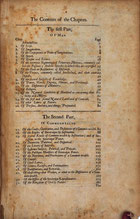
“Sudden Glory, is the passion which maketh those Grimaces called LAUGHTER.”
The First Part, Chapter 6, p. 27 (italics and spelling as per text)
Leviathan (1651)

Leviathan or The Matter, Forme and Power of a Common-Wealth Ecclesiasticall and Civil, commonly referred to as Leviathan, is a book written by Thomas Hobbes and published in 1651 . Its name derives from the biblical Leviathan. The work concerns the structure of society and legitimate government, and is regarded as one of the earliest and most influential examples of social contract theory. Leviathan ranks as a classic Western work on statecraft comparable to Machiavelli's The Prince. Written during the English Civil War , Leviathan argues for a social contract and rule by an absolute sovereign. Hobbes wrote that civil war and the brute situation of a state of nature could only be avoided by strong, undivided government.
“Sudden Glory, is the passion which maketh those Grimaces called LAUGHTER.”
The First Part, Chapter 6, p. 27 (italics and spelling as per text)
Leviathan (1651)
“For Appetite with an opinion of attaining, is called HOPE.”
Leviathan (1651)
“A Covenant not to defend my selfe from force, by force, is always voyd.”
The First Part, Chapter 14, p. 69
Leviathan (1651)
The Third Part, Chapter 36, p. 226 (See also: Glossolalia)
Leviathan (1651)
The First Part, Chapter 6, p. 29 (See also: Rene Girard)
Leviathan (1651)
“No man is bound by the words themselves, either to kill himselfe, or any other man.”
The Second Part, Chapter 21, p. 112
Leviathan (1651)
The Second Part, Chapter 24, p. 130 (See also: Velocity of money)
Leviathan (1651)